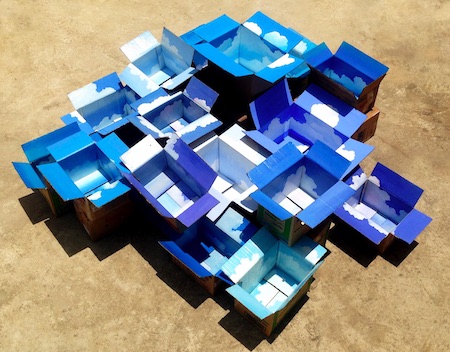Edgar Calel - Laberinto de los pájaros

Artist talk
Sunday, September 8, 2019, 7 p.m.
Chat and Food with Edgar Calel and Sebastián Eduardo
Showing the air that contains those moving objects that are transported from a warehouse to the communities, invites me to paint the skies of my town inside the cardboard boxes, allowing me to pack and displace the windy landscape that I live and breathe. Edgar Calel
What forms takes the migration of subjects and bodies anchored in a space and time crossed by colonialism, war, genocide and failed democracy, but who nevertheless cultivate and practice their own, ancestral, cultural and political cosmo-visions? Where exactly can we meet, „we“ who in various ways inhabit a common network of (neo-)colonial relations consolidated over the past 527 years? Can we get rid of the gesture of discovering and therefore conquering and appropriating subjects and bodies migrated from „the other side of the sea“? And what changes if also we live as migrants? Can we coincide in a center of the Global North in other ways than those imposed by the idea of the metropolis, that is, of the universal or world-city?
Artistic residences can be considered as temporary migrations, not only of the artist, subject, body, but also of her*his practice, concerns, means and materials of production that change according to the context. The artist Edgar Calel, currently Artist in Residency at the Rua du Sol, Porto, Portugal, will talk at uqbar with Sebastián Eduardo about his work. The two will also share food that they have found in local migrant markets and shops and discuss about the question of how the migration of recipes from Comalapa tastes.
The event is part of the project "This might be a place for humming birds", curated by Cagla Ilk and Antje Weitzel, which opens on November 15, 2019 at Galerie im Körnerpark, Berlin-Neukölln. The feminist and decolonial inspired project brings together contemporary art and cultural productions originated in Guatemala and located there. The idea for the project arose from a three-week research by the curators in spring 2019 in Guatemala.
In collaboration with insurgencias.net, Berlin-based platform for socially engaged artistic practices & activist positions from Latin America - as communication partners.
Edgar Calel was born in 1987 in San Juan Comalapa, Guatemala, where he lives and works. His main interest lies in the translation of cultural and political practices of Maya-Kaqchiquel into other contemporary languages. The artist is currently Artist in Residency at Rua du Sol, Porto, Portugal.
Sebastián Eduardo [Dávila] was born in 1993 in Guatemala City and studied art history and film studies in Jena (B.A.), Mexico City and Berlin (M.A.). He is a doctoral candidate in art history at the Leuphana University in Lüneburg, Germany, preliminary topic: “The decolonial turn in practices and terminology in postwar Guatemala. Art history as delinking practice."
Artist Talk
Domingo 08.09.2019, 19 h
Plática y Comida con Edgar Calel y Sebastián Eduardo
Mostar el aire que contienen esos objetos móviles que son transportadas de una bodega hacia las comunidades me invitó a pintar los cielos de mi pueblo dentro de las cajas de cartón, siendo esto una manera de empacar y llevar a otros lugares ese viento paisaje que vivo y respiro. Edgar Calel
¿Qué formas toma la migración de sujetos y cuerpos anclados en un espacio y tiempo atravesados por el colonialismo, la guerra, el genocidio y la democracia fallida, pero que sin embargo cultivan y practican cosmo-visiones propias, ancestrales, culturales y a la vez políticas? ¿En qué punto nos encontramos y coincidimos, „nosotros“, que de maneras muy diferentes habitamos esta red de relaciones (neo-)coloniales que se ha ido consolidando durante los últimos 527 años? ¿Podemos librarnos del gesto de descubrir y por ende conquistar y apropiarse de sujetos y cuerpos emigrados „del otro lado del charco“? ¿Y qué cambia si nosotrxs también llevamos una vida migrante? ¿Podemos coincidir en una ciudad-centro del Norte Global de otras formas a las impuestas por la idea de la metrópolis, es decir de la ciudad universal o ciudad-mundo?
Las residencias artísticas son migraciones temporales, no sólo de la /del artista, sujeto, cuerpo, sino también de su práctica: sus inquietudes, medios y materiales cambian según el contexto. El artista Edgar Calel, actualmente Artist in Residency en Rua du Sol, Porto, Portugal, platicará con Sebastián Eduardo sobre su trabajo. Además, compartirán alimentos provenientes de mercados y tiendas de comida locales de / para migrantes, respondiendo a la pregunta: ¿a qué sabe la migración de recetas de Comalapa?
El evento es parte del proyecto „This might be a place for humming birds“, curado por Cagla Ilk y Antje Weitzel, que abrirá el 15 de noviembre de 2019 en la Galerie im Körnerpark en Berlín-Neukölln. Inspirado por el feminismo y la decolonialidad, este proyecto agrupa a producciones artísticas y culturales contemporáneas que surgieron y se sitúan en Guatemala. La idea del proyecto surgió a partir de una investigación de las curadoras en Guatemala a inicios de 2019.
Con la colaboración de insurgencias.net - plataforma berlinesa para prácticas artísticas de compromiso social y activismo de Latinoamérica - como communication partners.
Edgar Calel nació, reside y trabaja en San Juan Comalapa, Guatemala. Su interés principal es el de la traducción de prácticas Maya-Kaqchiqueles, tanto políticas como culturales, a otros lenguajes contemporáneos. Actualmente, el artista reside como Artist in Residency en Rua du Sol, Porto, Portugal.
Sebastián Eduardo [Dávila] nació en la Ciudad de Guatemala en 1993 y estudió Historia del Arte y Ciencias del Cine en la Universidad Friedrich Schiller en Jena (B.A,), en la Universidad Nacional Autónoma de México en la Ciudad de México y en la Freie Universität en Berlín (M.A.). Comenzará un proyecto de doctorado en la Leuphana Universität en Lüneburg con el título preliminar: „El ‘giro decolonial’ en prácticas y términos del arte contemporáneo en Guatemala de la posguerra. Una historia del arte del desprendimiento.“